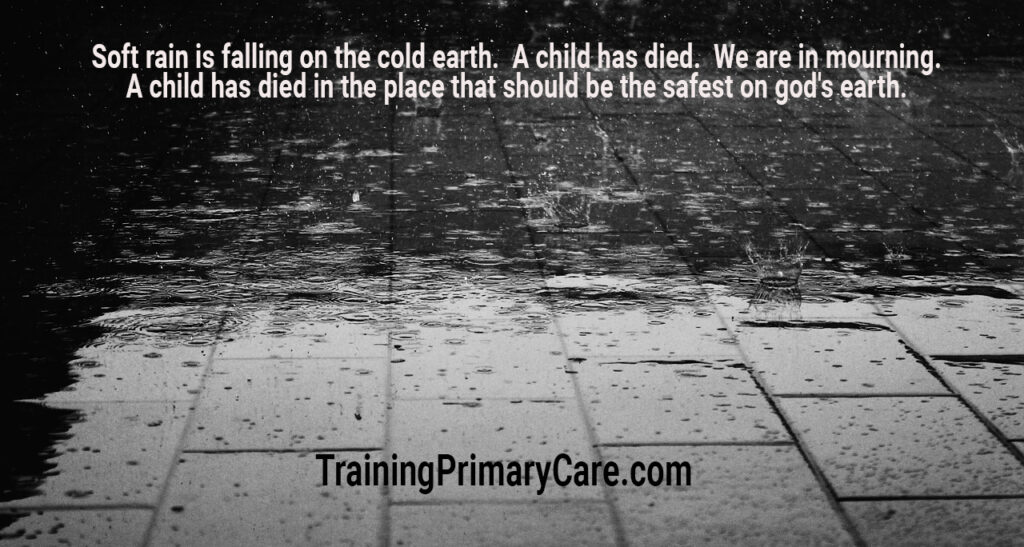News and Comment from Roy Lilley.
Soft rain is falling on the cold earth. A child has died. We are in mourning. A child has died in the place that should be the safest on god’s earth.
A child, entrusted to the only people we dare trust, beyond each other, beyond family, has died.
A child has died in a hospital, in the hands of a doctor.
It’s a tragedy, beyond tragedy. It is unspeakable. It is unbearable for a family imprisoned by grief. A tragedy that they will carry for the rest of their days; birthdays, celebration days, until the end of their days.
In the midst of this grief dare we spare a moment for a doctor who came to work on that fateful day, expecting that day to be like every other day. A day that turned into a disaster. A disaster that a family will never understand or forgive.
A disaster that stands ready to slip, unseen, into the lives of every doctor working pressured and distracted in the environment of emergency, life and death… and explode their careers.
Some illnesses come in disguise. Recognising them, especially in children, even with the panoply of modern diagnostics, is not guaranteed.
We are so used to daily miracles, cures, recovery, we take success for granted. We assume we will get better. We feel entitled. We reluctantly accept our elders will not live forever but our children… that’s different.
When catastrophe strikes we cannot expect families to forgive…
… but when catastrophe strikes, we have to learn. We have to figure out why. We must know about this-time, to prevent next-time. The past is the only ally we can trust to guide us into the future.
If the past is obscured, obfuscated, even lied about… we will never know. If fear, regulation, retribution slams the door, we are lost.
Regulators are run by unelected bureaucrats. They make up rules for us to fall foul of. Parliamentarians can only make laws and wait for us to trip.
No one makes anything, constructs anything, creates anything, thinks about anything that really, really helps when life goes badly wrong.
The case of Dr Bawa-Garba is not to be rehearsed here but it is a case that will hang heavy over every doctor reading this, every doctor working this day, the next day and all the other days.
People make errors. Stupid over-sights, carelessness or calamitous, horrendous mistakes. If we condemn organisations as unsafe and criminalise their people, if we tribunal them, prosecute them, send them off to a career stacking shelves… what have we learned.
In the Dr Bawa-Garba case, what have we learned about diagnosing sepsis? A condition that the world has trouble detecting. The NHS knows it has a problem. The Academy has devoted a whole report to sharing best practice. NHSE has targets, advice, action plans and guidance.
Celia Ingham Clark MBE, SFFMLM, MChir, FRCS, FRCA Medical Director for Clinical Effectiveness NHS England, says;
‘Sepsis is a common cause of serious illness and death… an estimated 123,000 cases… each year and 37,000 deaths. The majority… occur in frail elderly patients with multiple comorbidities who are less able to withstand serious infections. However there continue to be… tragic deaths of children… in whom sepsis was not recognised and treated quickly enough…’
We have to learn how events happen, how to find the learning, how to stop it next time. How do we formulate regulation that can help people, who carry the mill stone of error on their shoulders, turn them to stepping stones for others.
There should be only one thing on the desk of the Secretary of State for Health and it is this issue. The institutions that are designed to protect us do not… it is Jeremy Hunt’s job to keep us safe. We are not.
The GMC was established in 1885 and has grown like a coral reef. The CQC has made-up standards and works as though it was 1960.
The Courts; we must aim higher. Justice is not served by punishment alone. To do justice to disaster we must learn from them.
There are alternative ways to deal with these crippling issues.
It’s time for a new journey to begin; from blame culture, to a just culture… move on from the assumption that everyone making a mistake is a reckless criminal.
——————————–
Contact Roy – please use this e-address
Know something I don’t – email me in confidence.
Leaving the NHS, changing jobs – you don’t have to say goodbye to us! You can update your Email Address from the link you’ll find right at the bottom of the page, and we’ll keep mailing.
———-
Disclaimer
Reproduced here at TraingPrimaryCare.com by kind permission of Roy Lilley.








